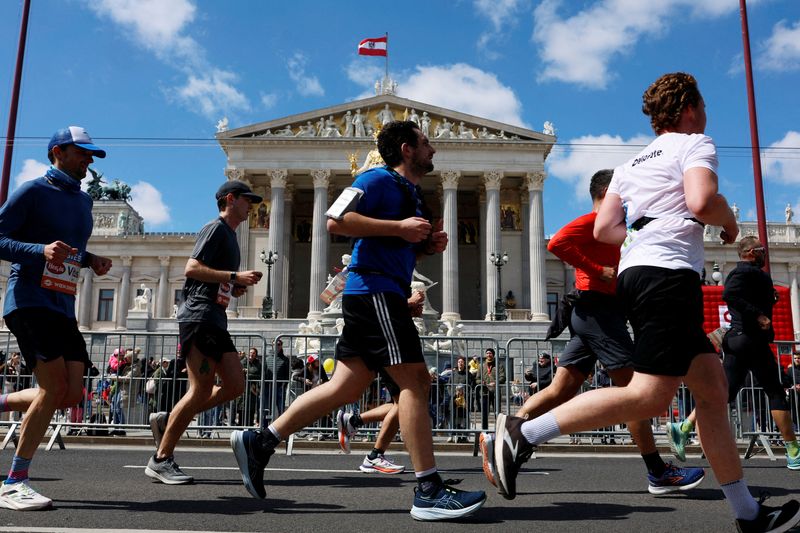
VIENNA (Reuters) – Austrians elect a new parliament on Sept. 29 in a vote that could put the far-right Freedom Party (FPO) in pole position to form a government for the first time in postwar history.
As the FPO is very unlikely to secure an absolute majority, it would need to find a coalition partner to govern.
WHAT ARE AUSTRIAN VOTERS MOST CONCERNED ABOUT?Higher living costs and stricter immigration rules have been the main issues, with security creeping in since police last month foiled a plot to attack a Taylor Swift concert in Vienna in which three of the suspects are teenage sons of immigrant families.
Widespread flooding in August and September has pushed climate change onto the agenda.
Polling at 27-29%, the Islam-critical FPO has for months led by about three points from the ruling conservative Austrian People’s Party (OVP), with the centre-left Social Democrats (SPO) third on around 21%.
Pursuing an “Austria First” agenda, the FPO backs so-called “remigration”, or returning people to countries their families originally came from – especially for law-breakers. The SPO is more liberal but still wants a redistribution of asylum-seekers that burdens Austria less.
Though easing, Austria’s headline inflation has for nearly two years been stuck above the European Union average, while growth has been below average. Austria depends heavily on Russian gas and is under mounting pressure to kick that habit.
WHAT HAPPENS IF THE FPO WINS?
FPO chief Herbert Kickl is a staunch critic of the European Union, and this year sealed an alliance with Hungarian Prime Minister Viktor Orban, a bugbear in Brussels who also wants to curb immigration.
Critics say Kickl draws on Nazi-era tropes, an accusation he denies. But his rhetorical prowess has helped to position him as the anti-establishment candidate – although he served as interior minister as recently as 2019.
Viewed by most of the political elite as too close to Russia, Kickl opposes sending aid to Ukraine. He is anathema to other party leaders, who have vowed not to work under him.
But if he were willing to let someone else be prime minister, as Dutch nationalist Geert Wilders did earlier this year, it could open the door to the first FPO-led government in the postwar era, shifting Austria to the right. He has shown no willingness to do this, however.
WHAT COALITIONS COULD FORM?
The FPO’s only viable coalition partner appears to be the OVP, which beat forecasts to finish narrowly behind the FPO in European elections in June.
An OVP victory would stymie Kickl’s bid to claim the chancellery, making an OVP-FPO alliance more likely.
Current polling suggests the OVP will emerge as kingmaker, able to choose between a coalition with the FPO or Austria’s first three-way alliance – with the SPO and either the liberal NEOS or the Greens, currently the OVP’s junior partners.
Neighbouring Germany embarked on its first tripartite coalition in 2021, and it has proved unwieldy and unpopular, boosting support for the extremes. A repeat in Austria, which has had a string of short governments, could ultimately boost the FPO.
Whoever wins looks likely to insist on tougher immigration rules. An FPO-OVP combination would open the door to tax cuts, while a more centrist one could accelerate the transition away from Russian gas.
THE VOTE AND WHAT COMES NEXT
Polling stations open from 6:45 a.m. (0445 GMT) and close at 5 p.m. (1500 GMT). Projections, usually highly reliable, are published soon after. The result is usually clear on the night, when all but postal ballots are counted. A count of postal ballots can take another couple of days.

President Alexander Van der Bellen, ex-leader of the Greens, will ask a party to form a government. Usually the first-placed party gets the call, but Van der Bellen has voiced reservations about the FPO, and Kickl in particular.
Reaching a detailed coalition agreement generally takes about two months. Its contents and the new government are then announced.
This post is originally published on INVESTING.


